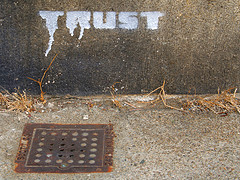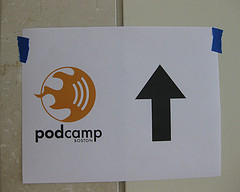 Which do you prefer, crossword puzzles or scrabble?
Which do you prefer, crossword puzzles or scrabble?
Your answer might say more about you than you think.
What if understanding what kind of puzzle-solver you were could help you break out of a rut, find a creative solution to a vexing problem, or make a really difficult decision a lot easier?
Me, I’m a crossword puzzler. I like words — but more than that, I like thinking about the meanings of words. I love wrestling with a tough bunch of clues attached to a frighteningly blank grid of black-and-white squares. I especially love sparring with my opponent — the puzzle designer — whose goal is to try to deceive me, baffle me, or at least temporarily confuse me, by the carefully selected and cryptic clues at the bottom of the page.
Now, lots of friends of mine are addicted to Scrabble. That is, they are addicted to the wildly popular online versions of a Scrabble-like game that is no longer called Scrabbulous. They know how much I love crosswords, so they wonder why I do not join in. It’s the same thing, right? Placing letters onto a grid to form intersecting words? Only instead of competing against an unseen puzzle writer, I’d be competing against other people!
I used to wonder why I didn’t care for Scrabble, too. I mean, it’s okay. I think I own a copy of the game, somewhere. But I’ll tell ya, I don’t keep a game of Scrabble in the bathroom, and I don’t keep a set of letter tiles next to the bed. That’s where the crosswords live, in my world.
Well, it turns out that there is a difference — a big difference — between crosswords and Scrabble.
It occurred to me the other day, while I was reading something for school.
In a crossword puzzle, there is always an answer. Crossword puzzles don’t get published unless they obey a number of very strict, sometimes really esoteric rules.
In Scrabble, you are given a handful of random letter tiles, out of which you may or may not be able to form a word (in combination with a letter or letters already on the gameboard).
In crossword puzzles, you know a solution exists.
In Scrabble, you don’t know if a solution exists or not.
I like crosswords for the same reason that I always liked geometry — and disliked algebra — when I was in high school. When you are solving a geometry proof, you know that the lines and angles need to obey certain rules, and that they have certain properties that you can trust. You can rely on a right angle to always be 90 degrees, you can rely on the angles that make up a line to equal 180 degrees… and parallel lines will never, ever touch.
I loved solving proofs in geometry and knowing the answer was there, somewhere, if I only looked at it in just the right way, if I just had enough time, and could focus, and knew all the rules.
(By the way, even though I am generally a fan of algebra, I didn’t like algebra once I was introduced to equations in which more than one answer was possible. Although when that happened once in a crossword puzzle in the New York Times, I have to admit it was pretty cool.)
Scrabble skeeves me out. Scrabble is random. Scrabble does not guarantee a solution. Scrabble introduces more uncertainty into an already uncertain world. Scrabble is an unreliable narrator, and it’s for people who are much more comfortable with existentialism than I am.
So what does this have to do with anything?
Well, I’ve been wrestling with a number of intractable puzzles myself lately. Writing projects that require creative ideas and persuasive arguments that I don’t currently have on hand. Interpersonal relationships that require sensitivity and tact that can occasionally be difficult to summon. Plans for the future that require nimble moves and rapid adjustments, when fear and doubt might instead turn my mental muscles slack and my intrepidity… anemic. (I told you I liked words.)
And the other day, when I remembered why I love crossword problems, I realized that I might be able to apply the same logic to my own problems.
Just assume that there is a solution.
Then find it.
See, when I fear that there might not be a solution, that’s when I panic, and my puzzle-solving synapses fizzle and sputter. But if I just pretend… if I just act as if there is definitely a viable solution, then everything calms down and I can think.
So I tried it. And, for three consecutive mornings, I woke up with the answer — the solution — to each of my most pressing puzzles just sitting there, fully formed, in my head.
What if you’re a Scrabbler? Can you play a similar mind game on yourself? I’m not sure; I don’t know the mind of the Scrabbler as well as I know my own. But I would love to find out. Are you a Scrabbler? Can you play a similar trick on yourself, to force yourself to find the solution you crave?
Puzzles are, in the entirely standard meaning here employed, that special category of problems that can serve to test ingenuity or skill in solution. Dictionary illustrations are ‘jigsaw puzzle’ and ‘crossword puzzle,’ Consider the jigsaw puzzle whose pieces are selected at random from each of two different puzzle boxes. Since that problem is likely to defy … even the most ingenious of men, it cannot serve as a test of skill in solution. In any usual sense it is not a puzzle at all. Though intrinsic value is no criterion (of goodness) for a puzzle, the assured existence of a solution is.” (Kuhn, 1962)
Kuhn, T.S. (1962). The Structure of Scientific Revolutions. The University of Chicago Press: Chicago, IL.




 Seventy years ago today,
Seventy years ago today,  Which do you prefer, crossword puzzles or scrabble?
Which do you prefer, crossword puzzles or scrabble? A good friend of mine has this daughter, see. And this daughter is just insanely bright and accomplished. And a senior in high school. So she’s been spending this spring wondering where she will spend the next four years of her life. Fun times.
A good friend of mine has this daughter, see. And this daughter is just insanely bright and accomplished. And a senior in high school. So she’s been spending this spring wondering where she will spend the next four years of her life. Fun times.

